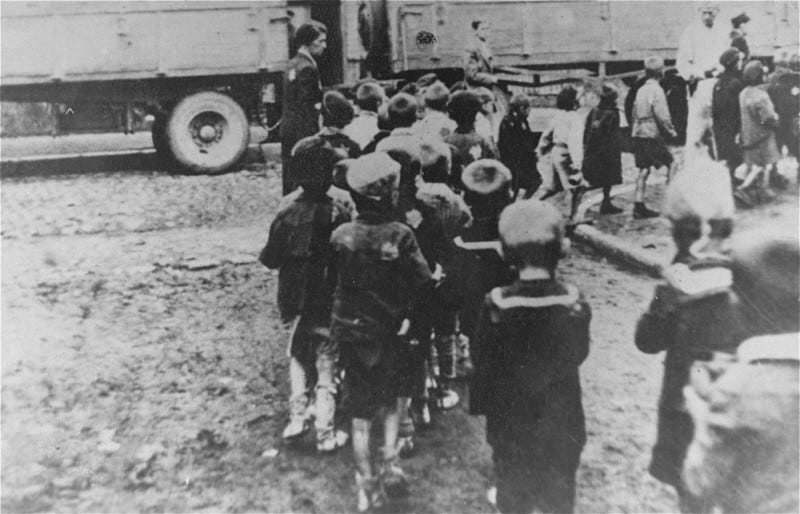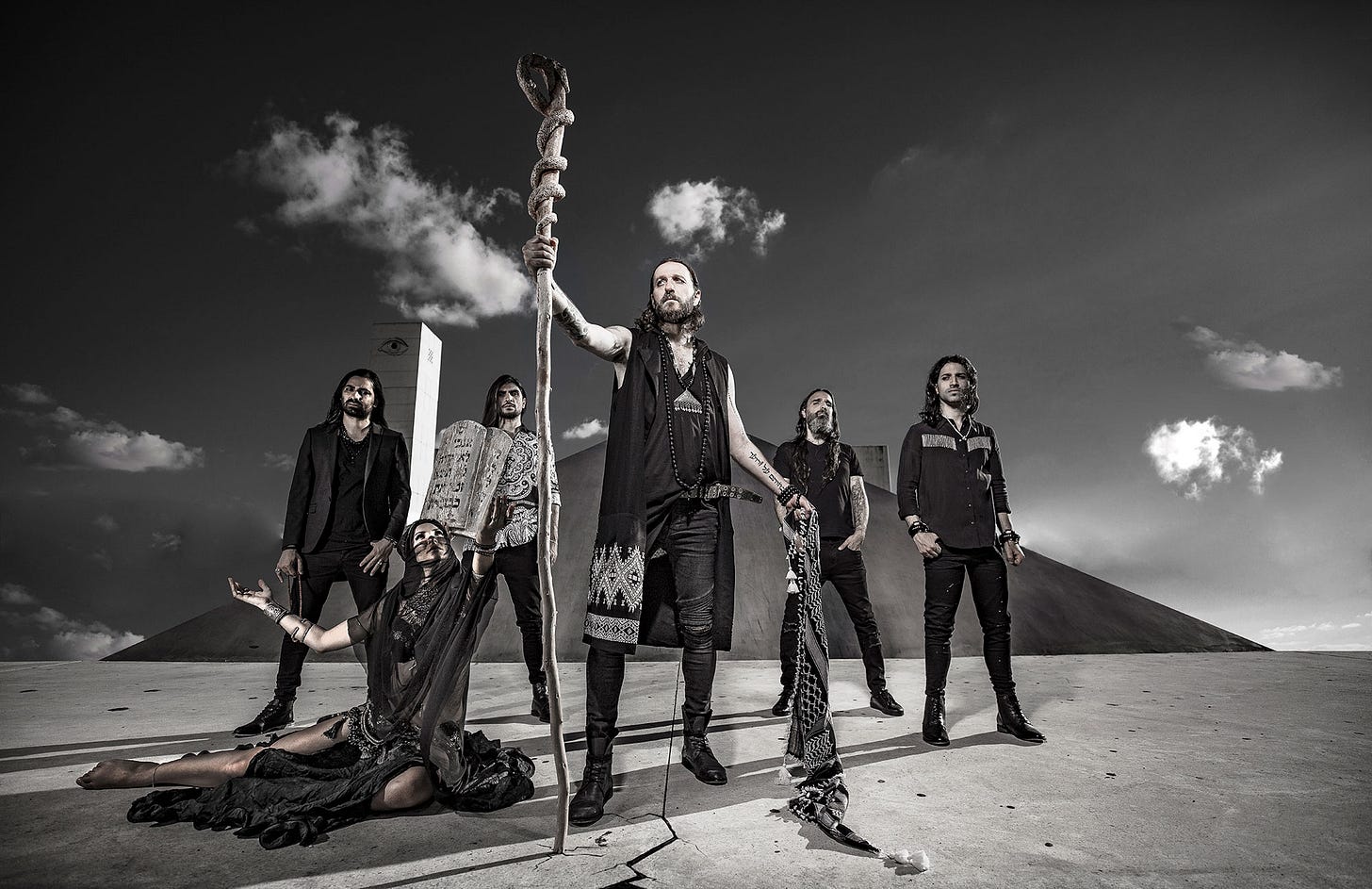Orphaned Land: Or How I Learned to Stop Worrying and Love the Genocide
Can't we all just get along?
All articles and videos are—and will always be—free to access. No paywalls, no locked content.
Subscribers ($5/month) get access to video transcripts and the comment section.
Not up for a monthly commitment? You can also throw a one-time tip my way via Buy Me a Coffee.
On September 4, 1942, Chaim Rumkowski, head of the Jewish Council (Judenrat) of the Łódź Ghetto, gave the most infamous speech of his life:
“They are asking us to give up the best we possess – the children and the elderly. […] I never imagined I would be forced to deliver this sacrifice to the altar with my own hands. In my old age, I must stretch out my hands and beg: Brothers and sisters! Hand them over to me! Fathers and mothers: Give me your children!”
Driven by delusions of grandeur, Rumkowski printed his own signature on the ghetto’s token currency, seeing himself as a saviour of the Jewish people. He zealously exploited the power that came from his collaboration with the Nazis, threatening with deportation anyone who opposed him. Despite the systematic killing of his people, Rumkowski had convinced himself that cooperation might secure some form of modus vivendi with the killers. That’s why, on that day in 1942, he begged the prisoners of the ghetto to surrender their children for deportation.
Unsurprisingly, Rumkowski’s collaboration achieved nothing. Like most of the inhabitants of the ghetto, he was eventually deported to Auschwitz, where he was reportedly killed by Sonderkommando inmates seeking revenge.
Much has been written about the ethical and moral dilemmas surrounding the role of the Judenräte during the holocaust. Primo Levi, Hannah Arendt, and Raul Hilberg, among many others, have all examined this question. Entire books, like Rab Bennet’s Under the Shadow of the Swastika: The Moral Dilemmas of Resistance and Collaboration in Hitler's Europe, have sought to analyze, contextualize, and sometimes even partially defend figures like Rumkowski.
Less controversial than the ethics of collaboration are its outcomes. No collaborationist Judenrat ever managed to stop or derail the machinery of genocide. Like Rumkowksi, many of their leaders were eventually murdered by same people they were trying to appease. “In order to save even a small part of the Jewish people, I alone had to lead others to their deaths” said Jacob Gens in 1942. As the head of Judenrat in the Vilna ghetto, he hoped collaboration would at least allow some to survive. He died the following year, after the ghetto was liquidated.
The wages of collaboration are death. And anybody who advocates for it, for the victims’ peaceful acceptance of the horrors imposed upon them, is asking them to walk willingly to their own destruction.
Which brings us to Kobi Farhi.
Inaccurately portrayed as an advocate for peace in the Middle East, Kobi Farhi, the singer of Orphaned Land, is a tireless apologist for the genocidal Israeli regime. He perpetuates the historically illiterate notion that the Palestinian conflict is rooted on religious hatred, rather than what even Zionist historians like Benny Morris described as “the fear of territorial displacement and dispossession." This distortion transforms the conflict into an endless religious war, an eternal battle over invented deities, rather than a brutal struggle over land, colonization, and survival.
His disregard for Palestinian survival, and his cowardly subservience to the Israeli state he never dares criticize, have long been evident. In Kobi’s universe, the problem isn't the Israeli military exterminating Palestinians, but the resentment those Palestinians feel toward their exterminators. If they could only find it in their hearts to do the work, check their privilege, and forgive, forget, and love the people raping and bombing their families, the conflict would be instantly solved. Everyone could hold hands, sing Kumbaya, and worship at the altar of the apartheid state.
Back in 2014, Kobi publicly stated that “the positive side” of Israel’s assault on Gaza was the artistic inspiration it gave him for new songs. That grotesque remark prompted a public exchange of letters between us. As expected, Kobi limited himself to regurgitate the usual Zionist talking points, while patting himself on the back for having once toured with a Palestinian band, and managing to be in the vicinity of Arabs without flinching. The Israeli equivalent of “some of my best friends are black.”
What Kobi did not address was the vast and well-documented record of Israel’s crimes: the apartheid regime enforced in the West Bank by racist and violent settler zealots, the systematic torture of prisoners, or the extrajudicial killings of Palestinians. Instead, Kobi offered syrupy platitudes, calling for people to get along and find love in their hearts. A Hallmark card response to a genocidal campaign.
Soundbites of “love and peace”, especially coming from an Israeli wearing a kufiyyeh (which he’s quick to remind us he wore before it was cool) might offer good vibes to some, but functionally they only serve to whitewash the genocide. Just as an Afrikaner embracing Black South Africans without opposing apartheid would have done nothing to dismantle that system, or a white Southerner declaring affection for African Americans while supporting segregation would have been no ally, Kobi’s professed love for Palestinians, absent any opposition to the crimes of his government, is, at best, shockingly idiotic. It reflects the kind of historical and legal understanding typically found among high school stoners, albeit without the charm or self-awareness.
As a useful idiot for Israeli war crimes, a Mitläufer in the Zionist project of Palestinian erasure, Kobi never questions the actions of his government. He conveniently forgets that the Israeli-Palestinian conflict has perpetrators and victims. In his fantasy version of the world, a captive population enduring what every major human rights organization now calls a genocide is expected not to resist, but to smile, forgive, and build a “peaceful future” alongside their executioners.

In a desperate bid to stay relevant while his country, led by a fugitive from the International Criminal Court, continues committing genocide, Kobi recently penned an open letter to Bob Vylan and Kneecap. In it, and not missing the opportunity to remind us yet again that he has Palestinian friends, he condemned the artists’ statements at the Glastonbury festival. According to Kobi, Bob Vylan’s chant of “Death to the IDF” and Kneecap’s call to “Free Palestine” do nothing but sow division and make peace harder to achieve. He warns against being “aggressively one-sided” in what he describes as a “war” that has lasted a hundred years.
In Kobi’s version of history, there was no Nakba, no ethnic cleansing during the founding of the Israeli settler-colonial state, and no clear aggressor. The Palestinians who lived on the land, and whose descendants now languish in refugee camps, are, in his eyes, just as culpable as the US- and EU-funded machinery that is bombing, starving, and dismembering them.
Perhaps even more so.
That the assault on Gaza has become the the deadliest conflict for children in modern history (including Ukraine, Iraq, and Afghanistan), —that Gaza now has the world’s highest number of children amputees, and that Israel is deliberately withholding food and water from its population, all seems to fall below Kobi’s threshold for moral concern.
Kobi’s war against “one-sidedness” never extends to his own countrymen. Not to the genocidal rhetoric casting Palestinians as Amalek to be exterminated. Not to the Israeli mobs marching through Jerusalem chanting “Death to Arabs.” Not to the parliamentarians who justify the rape of Palestinian prisoners , or the national reverence for war criminals. Kobi reserves his outrage only for obscure artists with no military power, saying allegedly offensive things on a distant stage.
Would Kobi have demanded love, compassion, and understanding for the Nazis from the starving Jews of the Warsaw Ghetto? Would he have condemned the “one-sidedness” of those who fought to liberate them during the 1943 uprising?
For Kobi, one-sidedness is only a problem when Israel is the side being called out. Unable to defend his country on the merits, yet unable to stop spewing pro-Israel propaganda, he falls back on the classic move of every genocidal regime: tone-policing its critics.
Kobi wants everyone to be Rumkowski.
And he hopes they’ll bring their children.




